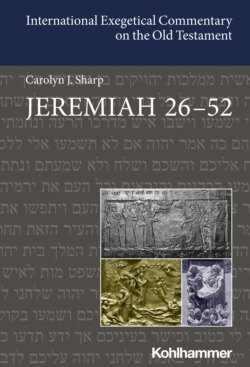Читать книгу Jeremiah 26-52 - Carolyn Sharp - Страница 16
На сайте Литреса книга снята с продажи.
Retributive Justice
ОглавлениеDivine intent to punishThe theology of the book of Jeremiah is centered on the notion that Yhwh, the God of Israel, is a deity who punishes covenantal disobedience by bringing military catastrophe upon Judah and Jerusalem. In Jeremiah we read of terror, siege, and famine; maiming injuries and slaughter; trauma, bereavement, incarceration, forced migration, and exile; and the continuing political and economic subjugation of an entire region by enemy invaders. For the ancient scribes, those horrific dimensions of life and death in a long-contested conflict zone are not simply the byproducts of human disputes. Rather, the causes and effects of these experiences of fear, loss, and despair have been intended by Yhwh as appropriate consequences for Judah’s sin. According to the notion of retributive justice, Judeans have abrogated Yhwh’s covenant—per the Dtr-Jer prose, abrogated it over and over again—and deserve to suffer the terrible consequences of their infidelity. The ideology is articulated with chilling clarity by Yhwh in Jer 17:
The sin of Judah is written with an iron pen; with a diamond point it is engraved on the tablet of their hearts, and on the horns of their altars, while their children remember their altars and sacred poles, beside every green tree…. Your wealth and all your treasures I will give for spoil as the price of your sin throughout all your territory. By your own act you shall lose the heritage that I gave you, and I will make you serve your enemies in a land that you do not know, for in my anger a fire is kindled that shall burn forever. (17:1–4)
The retributive theology on display throughout the poetry and prose of Jeremiah presents challenges for contemporary theologians and preachers. Jeremiah’s formulation of mutuality in covenant relationship between God and believers may be lifted up as a vital dimension of the life of faith and religious praxis. Poor choices on the part of believers and communities can lead to injurious outcomes, to be sure. But interpreters who are working within living communities of faith must take good care not to perpetuate the distorted view that those who suffer are to blame for their own agony and deserve what they are experiencing.
